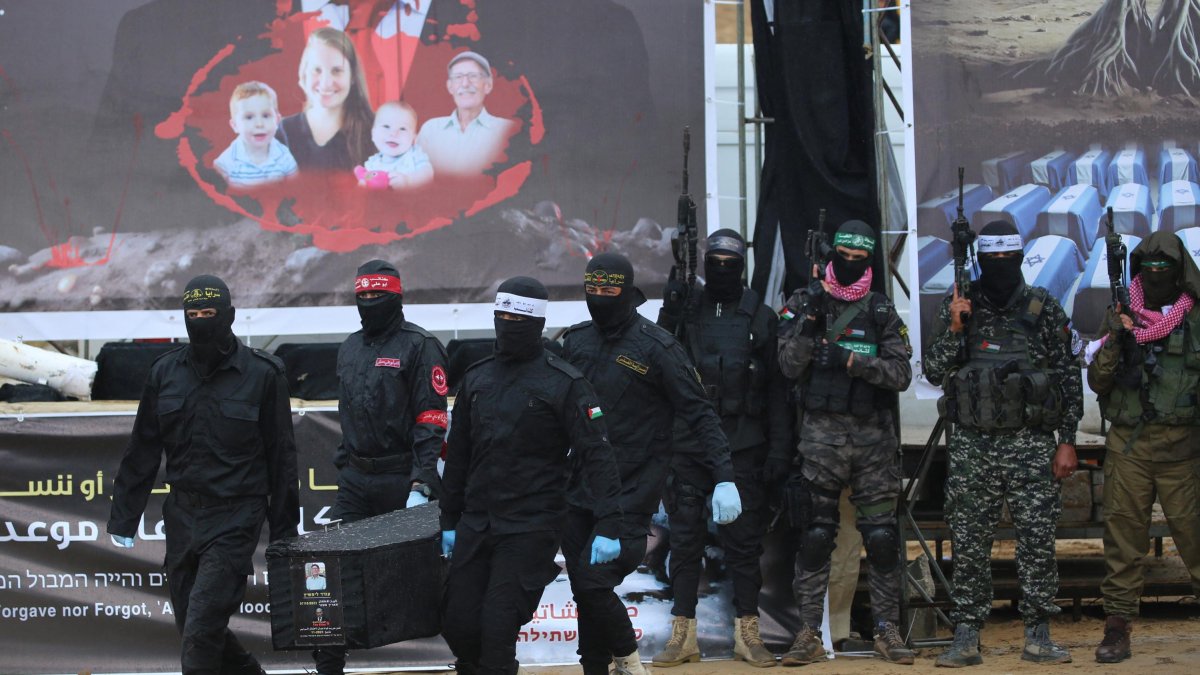Nation mourns Bibas family, Oded Lifshitz as bodies transferred to Israel
The IDF and Israeli authorities are gearing up for an emotional day as Hamas returns four dead captives.

Palestinian terrorists carry one of the coffins as they hand over the bodies of four Israeli hostages
Israel redeemed on Thursday the bodies of four fallen hostages from Hamas captivity in Gaza: the three members of the Bibas family—mother Shiri, infant son Kfir and his older brother Ariel, and Oded Lifshitz.
The Red Cross handed four coffins to Israel Defense Forces troops and Israel Security Agency (Shin Bet) agents in the Gaza Strip, after the international agency received the caskets from the Hamas terrorist group following a propaganda ceremony.
A brief military ceremony was held and presided over by the chief rabbi of the IDF before the bodies were to be taken to Israel for identification.
There are now 69 hostages remaining in Hamas captivity in Gaza, of which 36 are believed to be dead.
Although the Israeli government has made the names public, official confirmation of the hostages’ identity will depend on forensic analysis of the remains. On Wednesday, it emerged that the names were not to have been revealed prior to that confirmation, but were due to a miscommunication between the Israeli military and the government.
The Hostages and Missing Families Forum has urged the public to refrain from spreading rumors about the return of the fallen hostages and not to contact the families regarding the matter.
"The Coordinator for Captives and Missing Persons, Brigadier General (ret.) Gal Hirsch, has updated the families of the hostages through IDF representatives," according to a statement from Israeli Prime Minister Benjamin Netanyahu’s office on Thursday.
"In this difficult hour, our hearts are with the grieving families. We will continue to provide reliable information as required and request to avoid spreading rumors and unofficial information," the statement continued.

Politics
Security experts say Trump can stop Iran's nuclear program: 'credible military threat needed'
Sabrina Martin
"Do not eulogize until there is final confirmation"
The Bibas family has issued a statement urging patience.
“If there is to be bitter news, we need to receive it through the proper channels after all identification procedures are completed. We ask not to eulogize our loved ones until there is confirmation after final identification,” it said.
The Lifshitz family released a similar statement, noting that they had hoped things would turn out differently.
“These hours are not simple for us, after being informed that our beloved Oded is on the list of deceased hostages to be returned to Israel on Thursday, after being taken alive from his home in Kibbutz Nir Oz [on Oct. 7, 2023]. For 502 days we hoped and prayed for a different ending, but until we receive absolute certainty our journey will not end, and even afterward we will continue to fight until the return of the last hostage. We ask the media and the public not to contact us regarding this matter at present and to respect our privacy.”
Early morning: Handover process to begin
The initial stage of the handover involved the Red Cross receiving the fallen from Hamas at a predetermined location in Khan Yunis before transferring them to the IDF. Following the transfer, a military memorial ceremony was to take place inside Gaza, featuring the Israeli flag, a salute ceremony and a rabbi reciting from the Book of Psalms.
Dr. Gilad Bodenheimer, who heads Mental Health Services at the Israeli Ministry of Health, has advised against extended viewing of broadcasts covering the return: “We anticipate an extremely complex day as we receive the fallen hostages, and strongly recommend that the public limit their media exposure and minimize their viewing of Hamas psychological warfare tactics.”
Identification process
Following their return to Israeli territory, the coffins will be transported under police escort directly to the Abu Kabir Forensic Institute in Tel Aviv for identification. There, experts were set to conduct tests to determine both the cause and time of death.
The institute will employ standard identification methods including imaging scans, DNA sample extraction and laboratory analysis, and comparison with existing medical records such as dental X-rays. Reference samples have already been prepared, including DNA profiles provided by Israel Police.
According to the IDF, the identification process may take up to 48 hours, depending on the condition of the remains.
The families will be integral to the entire process. At their own request, they will remain at home rather than at a designated location, accompanied by IDF representatives. They will observe the military ceremony in real time, with documentation to be distributed afterward. The IDF will inform the families of the identification results before any public announcement is made.
Prof. Chen Kugel, who directs the National Institute of Forensic Medicine, elaborated: “We will exhaust every possibility to determine the circumstances of death. This isn’t always achievable, particularly with fallen who arrive after an extended period. Our commitment is to do everything possible to provide answers to the families about what happened to their loved ones.”
The confidential clause
Political officials have clarified that this release represents an unpublicized portion of the phase one ceasefire agreement, whereby eight hostages who died in captivity are to be returned in two stages. In exchange, Israel will free women and children detained in Gaza after Oct. 7, 2023.
Simultaneously, mediating parties are preparing for discussions about the deal’s second phase. Qatari Foreign Ministry spokesperson Majed al-Ansari stated on Tuesday that negotiations for the second phase haven’t officially commenced, though he confirmed that delegations from both Israel and Hamas are present in Doha.
A version of this article was originally published by Israel Hayom.
© JNS

























